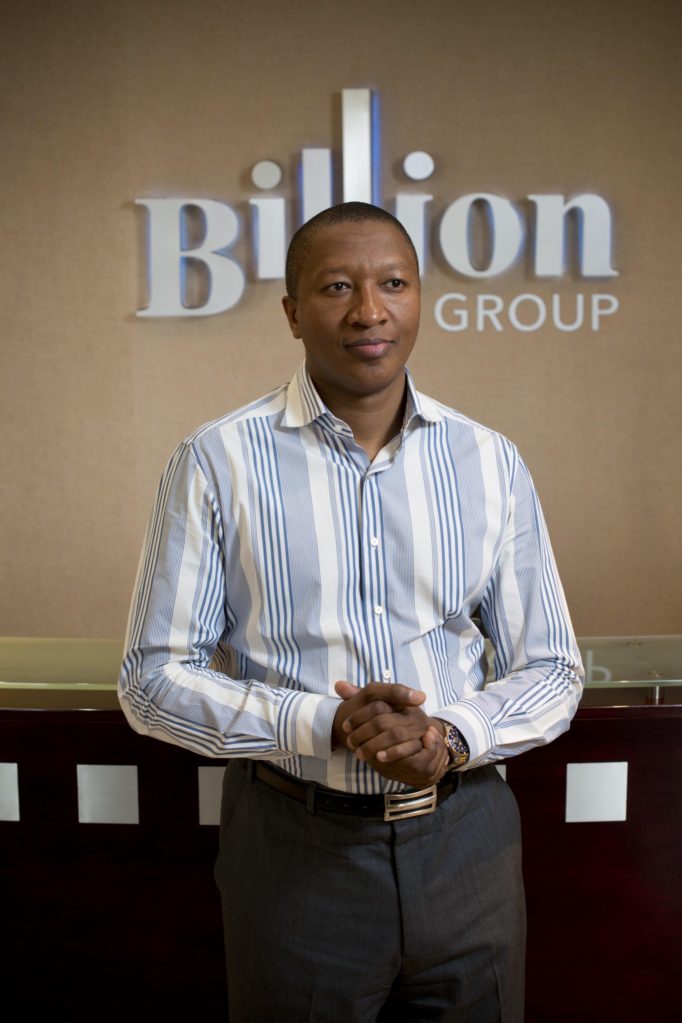Attention is not something 46-year-old Sisa Ngebulana seeks but at nearly two meters tall, it is hard to miss him. He also happens to own the aptly named Billion Group, which is worth R3.6 billion ($413 million).
The Johannesburg-headquartered company, located in the Montecasino entertainment complex, is busy with developments, in South Africa alone, worth more than R7 billion ($848 million).
Ngebulana, who was born in Mthatha in the Eastern Cape, also chairs the biggest black-managed property fund in the country—the Rebosis Property Fund. His success is drawing attention but this wasn’t always the case, in a long journey where much has changed.

Mdantsane City Mall, East London, Eastern Cape
“If you take Mdantsane Mall for example it was a piece of veld [field] where women would be raped when they crossed at night. Today, it is a mall that employs thousands of people and which employed 3,000 at its height during construction. The mall also contributes R140 million ($16 million) to the local fiscus,” says Ngebulana.
Loading...
The R500 million ($57 million) Mdantsane Mall, which was constructed in 2008, was the second biggest mall in the Eastern Cape at the time. It represented the first time the public became aware of the property mogul, even though it was not his first business.
Ngebulana started out as an estate agent while studying towards an LLB degree at the University of Natal. After completing his studies he became a candidate attorney at De Villiers Attorney’s—now Werskmans Attorneys—in Cape Town. In 1996, he moved to Johannesburg to open Blue Truck Rentals.
“That business didn’t go so well. I put all my eggs
in one basket and when one of the bottling companies,
I was contracted to, went down I had to close down.”
He dusted off his law degree and got a nine-to-five job at Eskom, South Africa’s energy supplier, as legal counsel. He moved up the ranks rapidly, but could not repay the bank the money owed for the failed truck business, and gave business another go. This time, he got involved in coal mining.
“With the R10,000-a-month ($1,100) salary; with a take home of just over R5,000 ($573) after deductions I could not have been able to pay the R1 million-a-month ($115,000) I owed the bank. I only qualified for a R230,000 ($26,000) mortgage bond that would have taken 30 years for me to pay back,” he says.
Needless to say, the worse happened—the coal business failed.
After experiencing an 11 month dry-spell, without a job or any prospects, he made a deal with a generous landowner. He subdivided one of the landowner’s plots in upmarket Hyde Park, Johannesburg and sold houses off plan, making a small profit. The bank then gave him an overdraft and he built another cluster of 20 homes.
From the profit, he was able to acquire commercial buildings such as the Bank of Lisbon building in Pretoria. He was now playing with the big boys but problems arose when he decided to go into retail.
“The nice thing about shopping malls is that it’s a science. You have to do your market research, you have to convince retailers. It is hard work and not everyone can do it,” he says.
He encountered challenges even before he started building his flagship R1.5 billion ($172 million) Hemingways shopping mall, in East London. There was a bidding war to build the first regional mall in the Eastern Cape. Some of the biggest names in South African property development—Investec, Growthpoint and Atterbury—wanted a piece of the pie. Everyone agreed that there could only be one winner: the Billion Group.
“Retail, besides track record and delivery, is about location, location, location. I managed to convince the retailers that my location was the best. It is simple as that,” says Ngebulana.
Some argued political interference and many others looked to ensure that he failed even before he started building. Ngebulana becomes animated as he talks about one of his detractors.
“The MD of Grinaker at the time swore he could close us down. He said he had a bigger wallet and was going to discourage subcontractors from doing business with us,” he says.
The Grinaker MD had enough reason to be angry. After his company reneged on the deal to build Hemingways—Grinaker deny that they submitted a tender to build the mall but would not confirm or deny the comments attributed to their former MD—Ngebulana poached some of their senior staff to start Billion Construction. True to the MD’s alleged words, suppliers and subcontractors refused to do business with Billion. So Billion bought material from Europe, opened a concrete manufacturing plant in Mthatha and made its own steel beams on site. The Platinum Group, which owns luxury brands like Aca Joe and Jenni Button, was not ready to open some of its stores in East London so Billion Retail was created.
“The mall was opened not a day too early, not a day too late,” he says.
What of the accusation that Ngebulana is a beneficiary of the ruling African National Congress?
“People speculate too much. I have never had a relationship with the African National Congress. I have never been a member of the ANC. Sometimes I don’t blame these people. Maybe that is what they are seeing of black people in this country; that they only do things because of connections.
“When I won over the retailers in East London, where were politics? When I formed my own contractor, because I was being stifled by competitors, where were politics? There is a war out there. It doesn’t suit certain circles in business to see a black entrepreneur getting to where I am because it motivates others, and tomorrow there will be more black entrepreneurs and the notion of Black Economic Empowerment (BEE) will go out the window” Ngebulana says.
Hombisa Bubu, a former executive at the Billion Group says, “When you work for him every minute must be productive. He is a hands-on kind of guy, very focused and knows what he wants”.
Interestingly, Bubu adds that when he met Ngebulana, in the early 2000s, he already owned a helicopter and a ten-seater airplane.
Billion Group’s outgoing chief financial officer, Thabo Lebelo, says Ngebulana is the most financially literate lawyer he knows and predicts big things to come.
“He is going to be Africa’s own Donald Trump,” he says.
The divorced father of two credits his grandfather for inspiring him to be the man he is today.
“He forced me to make bricks, to go behind the counter at his shop and to study law when I thought I would do better things with my life.”
The Billion Group is in the process of building the R1.75 billion ($201 million) Bay West City Mall in Port Elizabeth and the R1.3 billion ($146 million) Forest Hill City Mall in Pretoria, set to be opened in 2014.
Ngebulana is making in-roads into other countries. There are currently two malls being leased to retailers in Angola—one on the waterfront in Luanda, will cost $150 million; the other, on the mainland, will cost $100 million. The group also plans to build six shopping centers in Nigeria, collectively costing $300 million, and is busy with plans for malls in Uganda, Mozambique and Tanzania. Once complete, these projects will be worth R38 billion ($4.4 billion).
“The future is certainly Africa. The continent is ready for opportunities. There is a lack of formalized retail in the continent. We will be bringing that to the market and that will lead to things like furniture and fashion becoming cheaper,” he says.
Ngebulana is a businessman par excellence but what really drives him? Surely, he has enough money to relax?
“I am not into a game of money but a game of passion. I take risks, I have God on my side and I want to leave a legacy,” he says.
Loading...





















